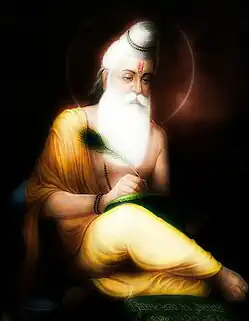Vyasa
Vyasa (Sanskrit: व्यास, vyāsa, literally “Compiler”) is an important figure in most Hindu traditions. He is sometimes called Veda Vyāsa (वेदव्यास, veda-vyāsa, "the one who classified the Vedas") or Krishna Dvaipāyana (referring to his complexion and birthplace). He is the author of the Mahabharata. He is also a character in it. He is considered to be the scribe of both the Vedas and Puranas. According to Hindu beliefs, Vyasa is an avatar of the god Vishnu.[1][2] Vyasa is also considered to be one of the seven Chiranjivins (long lived, or immortals), who are still in existence according to Hindu belief.

Vyasa born in Nepal lived around the 3rd millennium BCE.[3][4] The festival of Guru Purnima is dedicated to him. It is also known as Vyasa Purnima, for it is the day believed to be both his birthday and the day he divided the Vedas.[5][6]
In the Mahabharata
Vyasa appears for the first time as the compiler of, and an important character in, the Mahabharata. It is said that he was the expansion of the god Vishnu who came in Dwaparayuga to make all the Vedic knowledge available in writing which was available in only in spoken form at that time. He was the son of Satyavati, daughter of the fisherman Dusharaj,[7] and the wandering sage Parashara. He is credited with being the author of the first Purana, Vishnu Purana). Vyasa was born on an island in the Yamuna river.[8] There are two different views regarding the place of his birth. One of the views suggests that he was born in the Tanahun district in western Nepal. Another view suggests that he was born on Island in Yamuna river near Kalpi, Uttar Pradesh, India. Vyasa had a dark complexion and may be called by the name Krishna (black), and also the name Dwaipayana, meaning 'island-born'.
References
- Bhagavata Purana 1.4.14: (dvāpare samanuprāpte tṛtīye yuga-paryaye jātaḥ parāśarād yogī vāsavyāḿ kalayā hareḥ)
- Mahābhārata Kamala Subramaniam full edition
- "Legacy of the Elder Gods" by M. Don Schorn, p.256
- William R. Levacy. Vedic Astrology Simply Put: An Illustrated Guide to the Astrology of Ancient India. Hay House. p. 18.
- Awakening Indians to India. Chinmaya Mission. 2008. p. 167. ISBN 978-81-7597-434-0.
- Editors of Hinduism (2007). What Is Hinduism?: Modern Adventures Into a Profound Global Faith. Himalayan Academy Publications. p. 230. ISBN 978-1-934145-00-5.
- According to legend, Vyasa was the son of the ascetic Parashara and the dasyu) Satyavati and grew up in forests, living with hermits who taught him the Vedas. Encyclopædia Britannica
- Essays on the Mahābhārata, Arvind Sharma, Motilal Banarsidass Publisher, p. 205